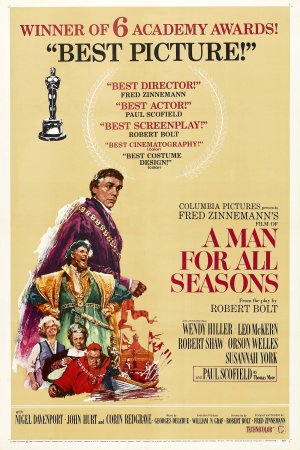
Appointed to succeed Cardinal Wolsey (Orson Welles) as Lord Chancellor, More has to contend with Henry VIII, who wants to divorce his sterile wife and take a new bride so that he can have a male heir.
However, for both political and spiritual reasons, Rome would not grant and annulment, and Henry decides to break with the Pope, declaring himself the leader of the new Church of England. When he demands More’s endorsement of his act, he causes a crisis: More is torn between loyalty to his king and concern with the integrity of his soul. A lawyer, More first hopes to survive through ethical conduct, but Henry’s rage and the manipulative machination sof Thomas Cromwell (Leo McKern) force his hand.
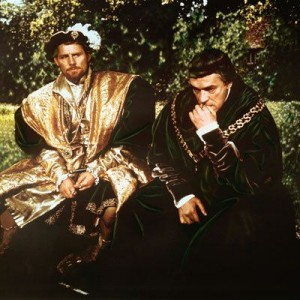 With the encouragement of Zinnemann, who also functioned as the producer, Bolt simplified his stage play and accentuated the differences between the characters, elevating More to the level of a noble saint, and undercutting the humor and dramatic wit that his play possessed.
With the encouragement of Zinnemann, who also functioned as the producer, Bolt simplified his stage play and accentuated the differences between the characters, elevating More to the level of a noble saint, and undercutting the humor and dramatic wit that his play possessed.
Bolt’s script reduces the tumultuous conflicts to the level of a shallow and boring domestic drama, in which the central figure is more of a symbol (or aggregate of values, he is a man who has no flaws, no emotions, no desires–and no depth.
Like most of Zinnemann’s films, “Man for All Seasons” is a prestigious production, dealing with “important” issues in a middlebrow manner that was suitable to moviegoers and Academy voters.
Zinnemann casts the film with a reputable ensemble–all the Who’s Who in the British theater. The cast included Wendy Holler, as Thomas’s wife Alice; Leo McKern as Thomas Cromwell, Orson Welles as Cardinal Wolsey; Susannah York as daughter Margaret More, John Hurt as Richard Rich; Nigel Davenport as the Duke of Norfolk; Colin Blakely as Matthew, and Corin Redgrave (brother of Vanessa and Lynn) as William Roper.
Zinnemann’s direction is decent and serviceable, but lacks visual imagination; the movie is dull and full of speeches and sermons. The camera does not move much, and when it does, it seems arbitrary.
However, Scofield, in his first major screen role (recreating his stage part), gives an admirably restrained and dignified performance, deemed by most critics as sublime.
The well-cast film put on the map several actor, including Robert Shaw, also stands out as the youthful, eccentric, and tempestuous King. In the next decade, Shaw would play major character roles in Hollywood movies, of which the best known is in Spielberg’s blockbuster, “Jaws.”
Detailed Plot
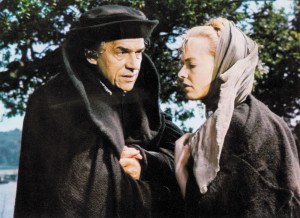 Cardinal Wolsey, the Lord Chancellor of England, summons Sir Thomas More to Hampton Court to inform him that King Henry VIII wishes to divorce his wife and marry Anne Boleyn. England needs a male heir to prevent another civil war, and More is the only member of the Privy Council who is against the marriage. When More claims the Pope will never grant a divorce, Wolsey suggests that they put “pressure” on the Church. More refuses to help.
Cardinal Wolsey, the Lord Chancellor of England, summons Sir Thomas More to Hampton Court to inform him that King Henry VIII wishes to divorce his wife and marry Anne Boleyn. England needs a male heir to prevent another civil war, and More is the only member of the Privy Council who is against the marriage. When More claims the Pope will never grant a divorce, Wolsey suggests that they put “pressure” on the Church. More refuses to help.
Back home at Chelsea, More finds Richard Rich, an acquaintance from Cambridge, who now pleads with More for a position at Court. More, citing corruption there, advises Richard to become a teacher instead.
More’s daughter Meg is in love with the brilliant lawyer William Roper, who wishes to marry her. The devoutly Catholic More declares his respect for Roper, but opposes to the marriage because he is Lutheran.
Wolsey dies, after being banished from Court for failing to extort a divorce from the Vatican, and King Henry appoints More as Lord Chancellor of England. The King visits More to inquire about his divorce. More remains unmoved as Henry alternates between threats, tantrums, and promises of unbounded Royal favor. More refers to Catherine of Aragon as “the Queen,” which angers the King.
King Henry returns to his barge and orders the oarsmen to cast off. Rich is asked by Thomas Cromwell if he has information that could damage More’s reputation. In exchange, Cromwell promises a position at Court.
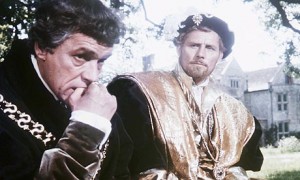 Roper, learning of More’s quarrel with the King, reveals that his religious opinions have altered considerably. He declares that by attacking the Roman Catholic Church, the King has become “the Devil’s minister.” More admonishes him to be more guarded as Rich arrives, pleading again for a position. When More again refuses, Rich denounces More’s steward as a spy for Cromwell.
Roper, learning of More’s quarrel with the King, reveals that his religious opinions have altered considerably. He declares that by attacking the Roman Catholic Church, the King has become “the Devil’s minister.” More admonishes him to be more guarded as Rich arrives, pleading again for a position. When More again refuses, Rich denounces More’s steward as a spy for Cromwell.
Humiliated, Rich joins Cromwell in an attempt to bring down More. The King tires of Papal refusals and declares himself “Supreme Head of the Church in England.” He demands that both the bishops and Parliament renounce allegiance to the Pope. More resigns as Lord Chancellor rather than accept the new order.
Cromwell suggests that if More attends the King’s wedding, he will have no further problems. When More declines to appear, he is summoned to Wolsey’s office at Hampton Court, now occupied by Cromwell. More is interrogated on his opinions but refuses to answer. Cromwell views him as a traitor, but allows him to return home.
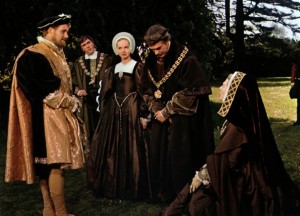 Meg informs More that a new oath about the marriage is being circulated. More says he would take the oath, if it only refers to the King’s marriage to Anne Boleyn. Upon learning that it also includes the King’s claim to be Supreme Head of the Church, More refuses to take it and is imprisoned in the Tower of London.
Meg informs More that a new oath about the marriage is being circulated. More says he would take the oath, if it only refers to the King’s marriage to Anne Boleyn. Upon learning that it also includes the King’s claim to be Supreme Head of the Church, More refuses to take it and is imprisoned in the Tower of London.
In spite of the bullying tactics of Cromwell, the subtle manipulation of Archibishop Thomas Crammer and the pleadings of the Duke of Norfolk and his family, More remains steadfast in his refusal. A request for new books to read backfires, resulting in confiscation of the books he has. When he is finally brought to trial, More remains silent until after being convicted of treason on the perjured testimony of Richard Rich, who is rewarded with an appointment as Attorney General of Wales.
More denounces the King’s actions as illegal, citing the Biblical basis for the authority of the Papacy. He declares that the Church’s immunity to State interference is guaranteed both in Magna Carta and in the King’s own Coronation Oath. More is condemned to death by beheading.
Epilogue
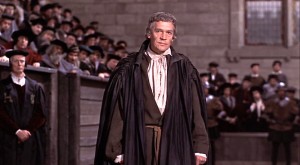 The narrated epilogue informs that Thomas More’s head was stuck on Traitor’s Gate for a month. Then his daughter, Margaret, removed it and kept it ’til her death. Cromwell was beheaded for high treason five years after More. The Archibishop was burned at the stake. The Duke of Norfolk should have been executed for treason but the King died of syphilis the night before. Richard Rich became Chancellor of England and died in his bed.
The narrated epilogue informs that Thomas More’s head was stuck on Traitor’s Gate for a month. Then his daughter, Margaret, removed it and kept it ’til her death. Cromwell was beheaded for high treason five years after More. The Archibishop was burned at the stake. The Duke of Norfolk should have been executed for treason but the King died of syphilis the night before. Richard Rich became Chancellor of England and died in his bed.
Context
Despite cinematic flaws, “A Man for All Season” was favored by the Academy for its noble and human messages and retelling of an historically significant event. This may explain why it won over its major competitor that year, Mike Nichols’s stunning debut, “Who’s Afraid of Virginia Woolf?” which garnered the largest number of nominations.
Oscar Alert
Nominated for 8, the film won 6 Oscars, including Best Picture, Director (second for Zinnemann after From Here to Eternity”), Actor, Screenplay, Color Cinematography (Ted Moore), and Color Costume Design (Elizabeth Haffenden, Joan Bridge).
The movie lost in the supporting acting categories (Robert Shaw and Wendy Hiller), which went to George Segal and Sandy Dennis, both for “Who’s Afraid of Virginia Woolf?”)










